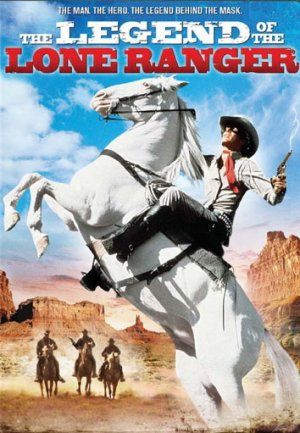Scenic locales, gorgeous cinematography, superb set design, atmospheric art direction, and a first-class supporting cast cannot salvage "Monte Walsh" director William A. Fraker's lame western "The Legend of the Lone Ranger" with a impassive Klinton Spilsbury cast as the Masked Man. Spilsbury is a tall, lean gent with a strong chin and a dashing profile. In other words, he would have made a great Marlboro Man, but he conveys no sense of presence. Not only is this western an origins epic establishing the genesis of the Lone Ranger, but it is also an abduction opus since the hero must rescue President Ulysses S. Grant from the villainous Major Bartholomew 'Butch' Cavendish (Christopher Lloyd of "Back to the Future") who attacks his train. You would think President Grant would have surrounded himself with an army of soldiers as his bodyguards, but they are nowhere to be seen.
When we get our first glimpse of the Lone Ranger, John Reid is an
adolescent who saves a young Tonto from a gang of ruthless ruffians. No
sooner has young Reid saved Tonto from these villains than he scrambles
back to his home to find these same dastards attacking his ranch. They
gun down both his mother and father in cold blood, and later his big
brother packs him off to Detroit. Of course, Detroit would be the
perfect place since the original "Lone Ranger" radio series aired there
on WXYZ in the first place in 1933. Later, after he has grown up and
graduated from law school, he visits his brother, Captain Dan Reid
(John Bennett Perry of "Independence Day"),and they ride off in pursuit
of the gunmen who hanged a crusading newspaper publisher (John Hart of
"The Lone Ranger") in the dusty town of Del Rio, Texas. It seems that
Lucas Striker has printed some unkind words about Cavendish, and he
repays the favor by dispatching his hooligans to slip a noose around
his neck.

This 98-minute horse opera perished at the box office partially because of an ill-fated public relations campaign that stripped the original Lone Ranger--Clayton Moore--of his mask. After he finished making "The Lone Ranger and the Lost City of God," Moore appeared in various commercials with sidekick Jay Silverheels and attended movie conventions where he signed autographs. The was the primary way that the former Masked Man generated revenue for himself and his family in his later years. Something must have gone wrong in the process of making the movie because the producers used John Hart, who took over the role momentarily after a contract dispute. Particularly objectionable is the reliance upon a balladeer (country singer Merle Haggard) to provide musical narration that serves no purpose. We know everything that we need to know and then here comes Merle underlining what we already know.
If you didn't know any better, "The Legend of the Lone Ranger" might make a tolerable rainy day movie. Michael Horse plays Tonto, but the two generate little sense of camaraderie. "Your sins will be paid for in the fires of hell," proclaims Grant when he sentences Cavendish to prison. He could have been the idiots who took away Clayton Moore's mask and came up with this oater. Stacy Keach's younger brother James dubbed Klinton Spilsbury's dialogue, but not even he can cry "Hi, Yo-Silver" with any enthusiasm. I grew up watching Clayton Moore and Jay Silverheels ride across the small screen as well as the big screen in "The Lone Ranger" and "The Lone Ranger and the Lost City of Gold," and both of these outings surpass this technically elegant looking sagebrusher. The DVD release of this inferior western is just as lame because it is presented in the Pan & Scan format until the end credits roll and the images appear in widescreen letterb0xed format.











